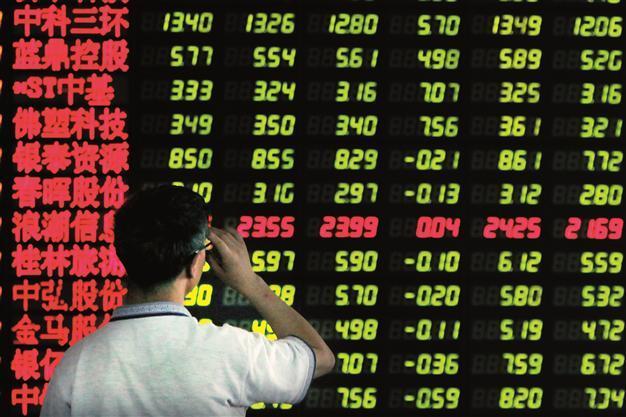China’s markets calmed, but tighter policy looms
SHANGHAI - Reuters

An investor reads information displayed on an electronic screen in Shanghai. AFP photo
China’s financial markets were calmed yesterday after days of turmoil by the central bank’s pledge to prevent any lasting credit crunch, but stocks kept slipping as investors braced for tougher conditions in the world’s second-largest economy.The People’s Bank of China said late on June 25 that it had helped some banks and was ready to act again as the lender of last resort for those caught in a short-term squeeze. However, it was also sticking to its stance of tightening market conditions as it seeks to rein in sharp growth in informal lending.
The central bank wants to curtail funds flowing into China’s vast “shadow” financial system that fuels property and stock speculation and push money into more productive areas of the economy to secure more sustained growth.
But its decision to allow short-term borrowing costs to shoot up to extraordinary levels last week fanned fears that a temporary squeeze could morph into a lasting credit crunch and had roiled global markets. “Market sentiment has apparently improved somewhat, although the PBOC is still expected to stick to relatively tight liquidity policy,” said a dealer at a major state-owned bank in Shanghai.
The PBOC reiterated its warning to banks that they needed to manage liquidity more carefully and protect against risks of reliance on short-term borrowing, adding to expectations of tougher business conditions and possibly slower economic growth.
The benchmark seven-day repo rate opened down about a quarter of a point at around 7.20 percent on a weighted-average basis yesterday, before inching up to 7.26 percent, still well above the long-run average of 3 to 4 percent.
Cheap credit over
The central bank said it would actively inject cash “based on the market’s actual situation” and would “adjust banking system liquidity in a timely manner”.
The central bank’s words and actions convinced a growing number of analysts that while the worst-case scenario of a credit freeze and banking crisis seemed distant, the era of rapid growth fuelled by cheap credit was also over.
“The policy stance will likely remain tight. The statement indicated that the PBOC will stick to ‘prudent monetary policy’, which suggests that credit growth will continue to decline in the near term,” Nomura analysts said in a note. The PBOC also indicated that it would inject liquidity into financial institutions facing liquidity problems if those institutions ‘help the real economy’.
The revelation that the PBOC had supported unnamed individual institutions came after outages at automatic teller machines and Point of Sales terminals at two of China’s largest banks caused concern among the public.
















